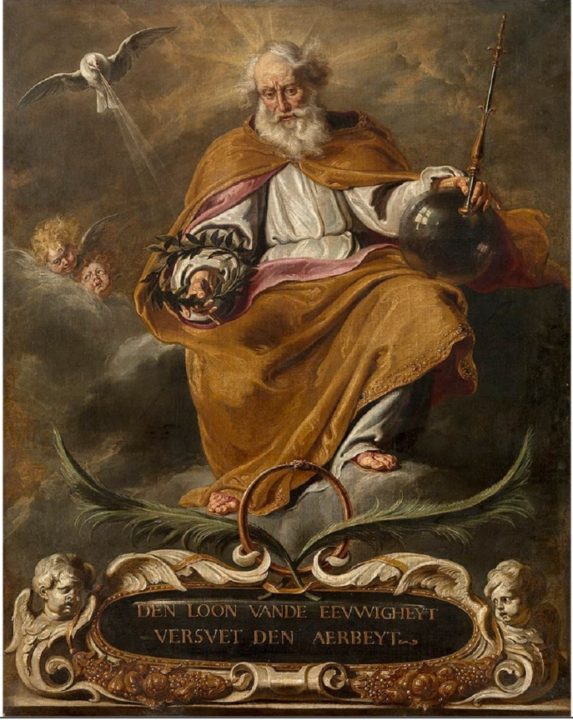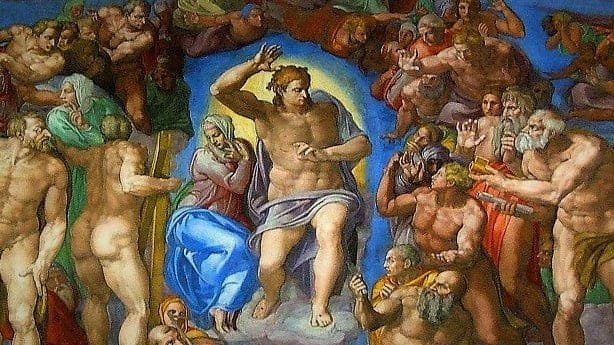POPE FRANCIS’ REFLECTION ON THE 30th SUNDAY IN ORDINARY TIME YEAR A.

HOMILY OF HIS HOLINESS POPE FRANCIS
St Peter’s Basilica
30th Sunday in Ordinary Time Year A – Sunday, 29 October 2023
____________________________
A doctor of the Law comes to Jesus under a pretext, in order to test him. The question he asks, however, is an important and enduring one that, at times, arises in our own hearts and in the life of the Church: “Which commandment in the law is the greatest?” (Mt 22:36). We too, immersed in the living stream of Tradition, can ask: “What is the most important thing? What is the driving force?” What matters so much as to be the guiding principle of everything? Jesus’ answer is clear: “You shall love the Lord your God with all your heart, and with all your soul, and with all your mind. This is the greatest and first commandment. And a second is like it: You shall love your neighbor as yourself” (Mt 22:37-39).
Brother Cardinals, Bishops and priests, men and women Religious, dear brothers and sisters, at the conclusion of this stage of our journey, it is important to look at the “principle and foundation” from which everything begins ever anew: by loving. Loving God with our whole life and loving our neighbour as ourselves. Not our strategies, our human calculations, the ways of the world, but love of God and neighbour: that is the heart of everything. And how do we channel this momentum of love? I would propose two verbs, two movements of the heart, on which I would like to reflect: to adore and to serve. We love God through adoration and service.
The first verb, adore. To love is to adore. Adoration is the first response we can offer to God’s gratuitous and astonishing love. The amazement of adoration, the wonder of worship, is something essential in the life of the Church, especially in our own day in which we have abandoned the practice of adoration. To adore God means to acknowledge in faith that he alone is Lord and that our individual lives, the Church’s pilgrim way and the ultimate outcome of history all depend on the tenderness of his love. He gives meaning to our lives.
In worshiping God, we rediscover that we are free. That is why the Scriptures frequently associate love of the Lord with the fight against every form of idolatry. Those who worship God reject idols because whereas God liberates, idols enslave. Idols deceive us and never bring to pass what they promise, because they are “the work of men’s hands” (Ps 115:4). Scripture is unbending with regard to idolatry, because idols are made and manipulated by men, while God, the Living God, is present and transcendent; he is the one “who is not what I imagine him to be, who does not depend on what I expect from him and who can thus upset my expectations, precisely because he is alive. The proof that we do not always have the right idea about God is that at times we are disappointed: We think: ‘I expected one thing, I imagined that God would behave like this, and instead I was wrong’. But in this way, we turn back to the path of idolatry, wanting the Lord to act according to the image we have of him” (C.M. Martini, I grandi della Bibbia. Esercizi spirituali con l’Antico Testamento, Florence, 2022, 826-827). We are always at risk of thinking that we can “control God”, that we can confine his love to our own agenda. Instead, the way he acts is always unpredictable, it transcends our thinking, and God’s way of acting consequently demands amazement and adoration. Amazement is very important!
We must constantly struggle against all types of idolatry; not only the worldly kinds, which often stem from vainglory, such as lust for success, self-centredness, greed for money – let us not forget that the devil enters “through the pockets”, the enticements of careerism; but also those forms of idolatry disguised as spirituality – my own spirituality: my own religious ideas, my own pastoral skills… Let us be vigilant, lest we find that we are putting ourselves at the centre rather than him. And let us return to worship. May worship be central for those of us who are pastors: let us devote time every day to intimacy with Jesus the Good Shepherd, adoring him in the tabernacle. May the Church adore: in every diocese, in every parish, in every community, let us adore the Lord! Only in this way will we turn to Jesus and not to ourselves. For only through silent adoration will the Word of God live in our words; only in his presence will we be purified, transformed and renewed by the fire of his Spirit. Brothers and sisters, let us adore the Lord Jesus!
The second verb is to serve. To love is to serve. In the great commandment, Christ binds God and neighbour together so that they will never be disconnected. There can be no true religious experience that is deaf to the cry of the world. There is no love of God without care and concern for our neighbour; otherwise, we risk becoming pharisaic. We may have plenty of good ideas on how to reform the Church, but let us remember: to adore God and to love our brothers and sisters with his love, that is the great and perennial reform. To be a worshiping Church and a Church of service, washing the feet of wounded humanity, accompanying those who are frail, weak and cast aside, going out lovingly to encounter the poor. We heard in the first reading how God commanded this.
Brothers and sisters, I think of the victims of the atrocities of war; the sufferings of migrants, the hidden pain of those who are living alone and in poverty; those who are crushed by the burdens of life; those who have no more tears to shed, those who have no voice. And I think too of how often, behind fine words and attractive promises, people are exploited or nothing is done to prevent that from happening. It is a grave sin to exploit the vulnerable, a grave sin that corrodes fraternity and devastates society. As disciples of Jesus, we desire to bring to the world a different type of leaven, that of the Gospel. To put God in first place and, together with him, those whom he especially loves: the poor and the weak.
This, brothers and sisters, is the Church we are called to “dream”: a Church that is the servant of all, the servant of the least of our brothers and sisters. A Church that never demands an attestation of “good behaviour,” but welcomes, serves, loves and forgives. A Church with open doors that is a haven of mercy. “The merciful man”, said John Chrysostom, “is as a harbour to those who are in need; and the harbour receives all who are escaping shipwreck, and frees them from danger, whether they be evil or good; whatsoever kind of men they be that are in peril, it receives them into its shelter. You also, when you see a man suffering shipwreck on land through poverty, do not sit in judgment on him, nor require explanations, but relieve his distress.” (In pauperem Lazarum, II, 5).
Brothers and sisters, the General Assembly of the Synod has now concluded. In this “conversation of the Spirit,” we have experienced the loving presence of the Lord and discovered the beauty of fraternity. We have listened to one another and above all, in the rich variety of our backgrounds and concerns, we have listened to the Holy Spirit. Today we do not see the full fruit of this process, but with farsightedness we look to the horizon opening up before us. The Lord will guide us and help us to be a more synodal and missionary Church, a Church that adores God and serves the women and men of our time, going forth to bring to everyone the consoling joy of the Gospel.
Brothers and sisters, I thank you for all that you have done during the Synod and for all you continue to do. Thank you for the journey we have made together, for your listening and your dialogue. In expressing my gratitude, I would also like to offer a prayer for all of us: may we grow in our worship of God and in our service to our neighbour. To adore and to serve. May the Lord accompany us. Let us go forward with joy!
https://www.vatican.va/content/francesco/en/homilies/2023/documents/20231029-omelia-conclusione-sinodo.html
Copyright © Dicastero per la Comunicazione – Libreria Editrice Vaticana
ANGELUS
Saint Peter’s Square
Sunday, 29 October 2023
________________________________________
Dear brothers and sisters, buongiorno!
Today’s Gospel speaks to us about the greatest of the commandments (cf. Mt 22:34-40). A doctor of the law questions Jesus about this and He responds with the “great commandment of love”: “You shall love the Lord your God with all your heart and with all your soul and with all your mind (…) and (…) your neighbour as yourself” (vv. 37.39). Love of God and neighbour are inseparable from each other. So, let us pause a bit to reflect on this.
The first: the fact that love for the Lord comes first reminds us that God always precedes us, he anticipates us with his infinite tenderness (cf. Jn 4:19), with his closeness, with his mercy, for He is always near, tender and merciful. A baby learns to love on their mommy’s and daddy’s knees, and we learn it in God’s arms. The Psalm says, “Like a weaned child in the arms of its mother” (cf. 131:2). This is how we should feel in God’s arms. And there, we absorb the Lord’s affection; there, we encounter the love that impels us to give ourselves generously. Saint Paul recalls this when he says that the charity of Christ possesses a power that propels toward loving (cf. 2 Cor 5:14). And everything originates in Him. You cannot truly love others if you do not have this root, which is love of God, love for Jesus.
And now the second aspect that emerges from the commandment of love. It connects love for God to love for neighbour: it means that by loving our brothers and sisters, we reflect the Father’s love like mirrors. To reflect God’s love, this is the point – to love Him whom we do not see through the brother/sisters whom we do see (cf. 1 Jn 4:20). One day, Saint Teresa of Calcutta responded to a journalist who asked her if she had illusions about changing the world by which she was doing, “I no, I never thought I could change the world! I only wanted to be a drop of clean water, through which God’s love could shine” (Meeting with journalists after receiving the Nobel Peace Prize, Rome, 1979). This is how she, who was so little, was able to do so much good – by reflecting God’s love like a drop. And if at times, looking at her and other saints, we might be moved to think that they are heroes that cannot be imitated, let us think again about that small drop: love is a drop that can change many things. And how can this be done? Taking the first step, always. Sometimes it is not easy to take the first step,to forget things…, to take the first step – let’s do that. This is the drop – to take the first step.
So, dear brothers and sisters, thinking about God’s love that always precedes us, we can ask ourselves: Am I grateful to the Lord that he loves me first? Do I feel God’s love and am I grateful to him? And do I try to reflect His love? Do I strive to love my brothers and sisters, and take this second step?
May the Virgin Mary help us live the great commandment of love in our daily life:to love and to allow God to love us, and to love our brothers and sisters.
Source: https://www.vatican.va/content/francesco/en/angelus/2023/documents/20231029-angelus.html
ANGELUS ADDRESS
Sunday, 25 October 2020
Dear Brothers and Sisters,
Good morning!
In today’s Gospel passage (cf. Mt 22:34-40), a doctor of the Law asks Jesus “which is the great commandment” (v. 36), that is, the principal commandment of all divine Law. Jesus simply answers: “You shall love the Lord your God with all your heart, and with all your soul, and with all your mind” (v. 37). And he immediately adds: “You shall love your neighbour as yourself” (v. 39).
Jesus’ response once again takes up and joins two fundamental precepts, which God gave his people through Moses (cf. Dt 6:5; Lv 19:18). And thus he overcomes the snare that is laid for him in order “to test him” (Mt 22:35). His questioner, in fact, tries to draw him into the dispute among the experts of the Law regarding the hierarchy of the prescriptions. But Jesus establishes two essential principles for believers of all times two essential principles of our life. The first is that moral and religious life cannot be reduced to an anxious and forced obedience. There are people who seek to fulfil the commandments in an anxious or forced manner, and Jesus helps us understand that moral and religious life cannot be reduced to anxious or forced obedience, but must have love as its precept. The second principle is that love must tend together and inseparably toward God and toward neighbour. This is one of Jesus’ primary innovations and it helps us understand that what is not expressed in love of neighbour is not true love of God; and, likewise, what is not drawn from one’s relationship with God is not true love of neighbour.
Jesus concludes his response with these words: “On these two commandments depend all the law and the prophets” (v. 40). This means that all the precepts the Lord has given to his people must be related to love of God and neighbour.
In fact, all the commandments serve to implement, to express that twofold indivisible love. Love for God is expressed above all in prayer, particularly in adoration. We neglect the adoration of God a great deal. We recite the prayer of thanksgiving, the supplication to ask for something…, but we neglect adoration. Adoring God is precisely the heart of prayer. And love for neighbour, which is also called fraternal charity, consists in closeness, listening, sharing, caring for others. And so often we neglect to listen to others because it is boring or because it takes up our time, or [we neglect] to accompany them, to support them in their suffering, in their trials…. But we always find the time to gossip, always! We do not have time to console the afflicted, but so much time to gossip. Be careful!
The Apostle John writes: “he who does not love his brother whom he has seen, cannot love God whom he has not seen ” (1 Jn 4:20). Thus, we see the unity of these two commandments.
In today’s Gospel passage, once again, Jesus helps us go to the living and gushing wellspring of Love. And this wellspring is God himself, to be loved completely in a communion that nothing and no one can break. A communion that is a gift to be requested each day, but also a personal commitment not to let our lives become enslaved by the idols of the world. And the proof of our journey of conversion and holiness always consists in love of neighbour. This is the test: if I say “I love God” and do not love my neighbour, it does not work. The verification that I love God is that I love my neighbour. As long as there is a brother or sister to whom we close our hearts, we will still be far from being disciples as Jesus asks us. But his divine mercy does not allow us to be discouraged, but rather calls us to begin anew each day to live the Gospel consistently.
May the intercession of Mary Most Holy open our hearts to welcome the “great commandment”, the twofold commandment of love, which contains all of God’s Law and on which our salvation depends.
SOURCE: http://www.vatican.va/content/francesco/en/angelus/2020/documents/papa-francesco_angelus_20201025.html
EMPHASIS MINE.
ANGELUS ADDRESS
29 October 2017
Dear Brothers and Sisters, Good morning!
This Sunday [30th Sunday in Ordinary Time Year A], the Liturgy presents us with a brief, but very important Gospel passage (Mt 22:34-40). Matthew the Evangelist recounts that the Pharisees assemble in order to put Jesus to the test. One of them, a doctor of the Law, asks him this question: “Teacher, which one is the great commandment in the law?” (v. 36). It is an insidious question, because more than 600 precepts are mentioned in the Law of Moses. How should the great commandment be distinguished among these? But Jesus responds without hesitation: “You shall love the Lord your God with all your heart and with all your soul and with all your mind”. And he adds: “You shall love your neighbor as yourself” (vv. 37, 39).
This response of Jesus is not to be taken for granted, because, among the numerous precepts of the Hebrew Law, the most important were the 10 Commandments, communicated directly by God to Moses, as the conditions of the Covenant with the people. But Jesus wants to make it understood that without love for God and for our neighbour there is no true fidelity to this Covenant with the Lord. You may do many good things, fulfil many precepts, many good things, but if you do not have love, this serves no purpose.
It is confirmed by another text in the Book of Exodus, the so-called “Covenant Code”, where it is said that one cannot adhere to the Covenant with the Lord and mistreat those who enjoy his protection. And who are those who enjoy his protection? The Bible says: the widow, the orphan and the stranger, the migrant, that is, the most lonely and defenseless people (cf. Ex 22:20-21). In responding to those Pharisees who question him, Jesus also tries to help them put their religiosity in order, to distinguish what truly matters from what is less important. Jesus says: “On these two commandments depend all the law and the prophets” (Mt. 22:40). They are the most important, and the others depend on these two. And Jesus lived his life precisely in this way: preaching and practising what truly matters and is essential, namely, love. Love gives impulse and fruitfulness to life and to the journey of life: without love, both life and faith remain sterile.
What Jesus proposes in this Gospel passage is a wonderful ideal, which corresponds to our heart’s most authentic desire. Indeed, we were created to love and to be loved. God, who is Love, created us to make us participants in his life, to be loved by him and to love him, and with him, to love all other people. This is God’s “dream” for mankind. And to accomplish it we need his grace; we need to receive within us the capacity to love which comes from God himself. Jesus offers himself to us in the Eucharist for this very reason. In it we receive Jesus in the utmost expression of his love, when he offered himself to the Father for our salvation.
May the Blessed Virgin help us to welcome into our life the “great commandment” of love of God and neighbour. Indeed, if we have experienced it ever since we were children, we will never cease converting ourselves to it and putting it into practice in the various situations in which we find ourselves.
SOURCE: http://w2.vatican.va/content/francesco/en/angelus/2017/documents/papa-francesco_angelus_20171029.html
EMPHASIS MINE.

ANGELUS ADDRESS
26 October 2014
Dear Brothers and Sisters, Good morning,
Today’s Gospel Reading reminds us that the whole of Divine Law can be summed up in our love for God and neighbour. Matthew the Evangelist recounts that several Pharisees colluded to put Jesus to the test (cf. 22: 34-35). One of them, a doctor of the law, asked him this question: “Teacher, which is the greatest commandment in the law?” (v. 36). Jesus, quoting the Book of Deuteronomy, answered: “You shall love the Lord your God with all your heart, and with all your soul, and with all your mind. This is the greatest and first commandment” (vv. 37-38). And he could have stopped there. Yet, Jesus adds something that was not asked by the doctor of the law. He says, in fact: “And a second is like it, You shall love your neighbour as yourself” (v. 39). And in this case too, Jesus does not invent the second commandment, but takes it from the Book of Leviticus. The novelty is in his placing these two commandments together — love for God and love for neighbour — revealing that they are in fact inseparable and complementary, two sides of the same coin. You cannot love God without loving your neighbour and you cannot love your neighbour without loving God. Pope Benedict gave us a beautiful commentary on this topic in his first Encyclical Deus Caritas Est (nn. 16-18).
In effect, the visible sign a Christian can show in order to witness to his love for God to the world and to others, to his family, is the love he bears for his brothers. The Commandment to love God and neighbour is the first, not because it is at the top of the list of Commandments. Jesus does not place it at the pinnacle but at the centre, because it is from the heart that everything must go out and to which everything must return and refer.
In the Old Testament, the requirement to be holy, in the image of God who is holy, included the duty to care for the most vulnerable people, such as the stranger, the orphan and the widow (cf. Ex 22:20-26). Jesus brings this Covenant law to fulfilment; He who unites in himself, in his flesh, divinity and humanity, a single mystery of love.
Now, in the light of this Word of Jesus, love is the measure of faith, and faith is the soul of love. We can no longer separate a religious life, a pious life, from service to brothers and sisters, to the real brothers and sisters that we encounter. We can no longer divide prayer, the encounter with God in the Sacraments, from listening to the other, closeness to his life, especially to his wounds. Remember this: love is the measure of faith. How much do you love? Each one answer silently. How is your faith? My faith is as I love. And faith is the soul of love.
In the middle of the dense forest of rules and regulations — to the legalisms of past and present — Jesus makes an opening through which one can catch a glimpse of two faces: the face of the Father and the face of the brother. He does not give us two formulas or two precepts: there are no precepts nor formulas. He gives us two faces, actually only one real face, that of God reflected in many faces, because in the face of each brother, especially of the smallest, the most fragile, the defenseless and needy, there is God’s own image. And we must ask ourselves: when we meet one of these brothers, are we able to recognize the face of God in him? Are we able to do this?
In this way, Jesus offers to all the fundamental criteria on which to base one’s life. But, above all, He gave us the Holy Spirit, who allows us to love God and neighbour as He does, with a free and generous heart. With the intercession of Mary, our Mother, let us open ourselves to welcome this gift of love, to walk forever with this two-fold law, which really has only one facet: the law of love.


